Is Costa Rica Residency Worth It for You?
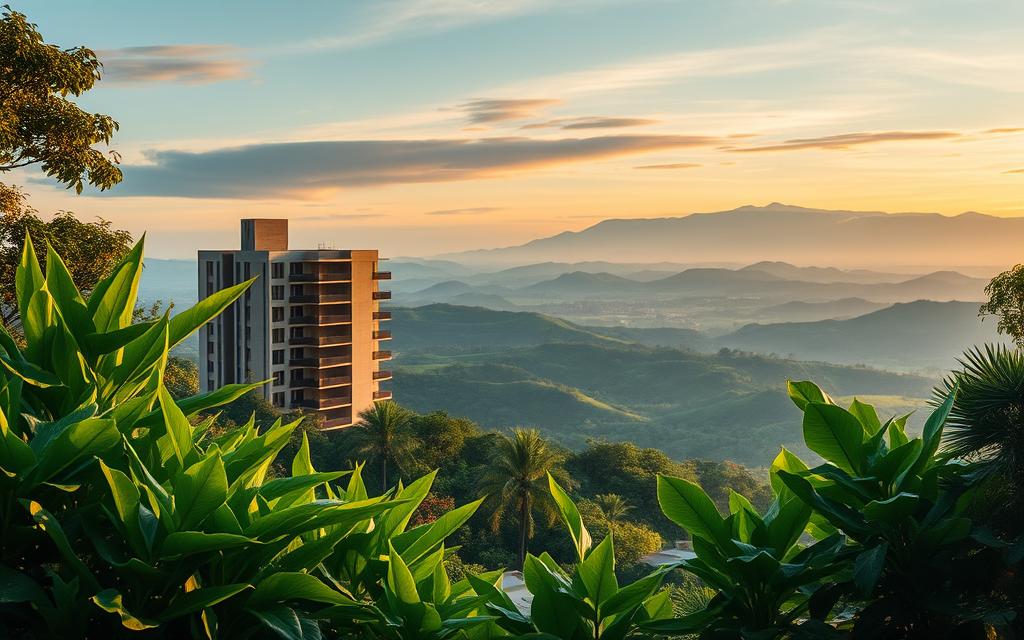
Costa Rica has become a haven for individuals and families seeking a better quality of life. With its stunning natural beauty, stable democracy, and high standard of living, this Central American country has positioned itself as a desirable destination for those looking to settle permanently or temporarily.
Obtaining legal residency status in Costa Rica unlocks numerous benefits, making daily life smoother and more secure. Residency eliminates the uncertainty of tourist visa renewals and provides access to essential services that are increasingly difficult to obtain as a non-resident.
As we explore whether Costa Rica residency is truly worth the investment, we'll examine the various residency options, their requirements, and the advantages of becoming a legal resident versus remaining a perpetual tourist.
Understanding Costa Rica's Appeal
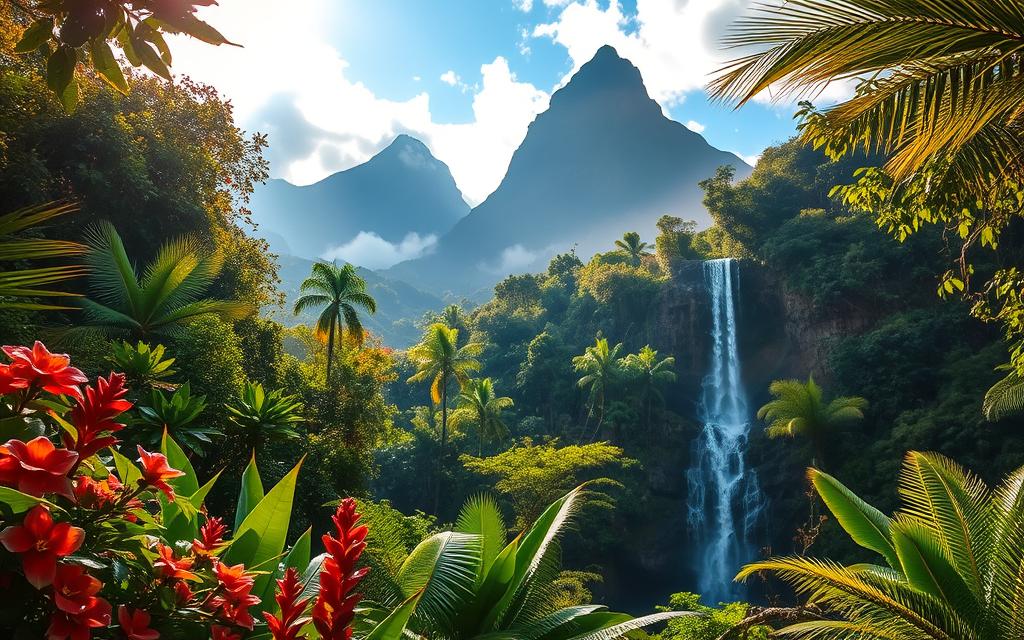
The allure of Costa Rica lies in its diverse ecosystems and the promise of a relaxed, 'pura vida' lifestyle. This Central American country is celebrated for its natural beauty, from lush rainforests to pristine beaches.
Natural Beauty and Climate Benefits
Costa Rica's varied landscapes attract nature lovers worldwide. The country's mild climate, with temperatures between 70-81°F year-round, makes it ideal for both residents and tourists. The "pura vida" philosophy reflects a relaxed and joyful way of living, contributing to the country's high rankings in global happiness indexes.
Political Stability and Quality of Life
Costa Rica's stable government and democratic process make it a safe and attractive option for expats. The country's commitment to environmental sustainability and high standard of living supports a comfortable lifestyle for residents of all ages. For more information on the benefits of living in Costa Rica, visit Jaros CR.
Is Costa Rica Residency Worth It?
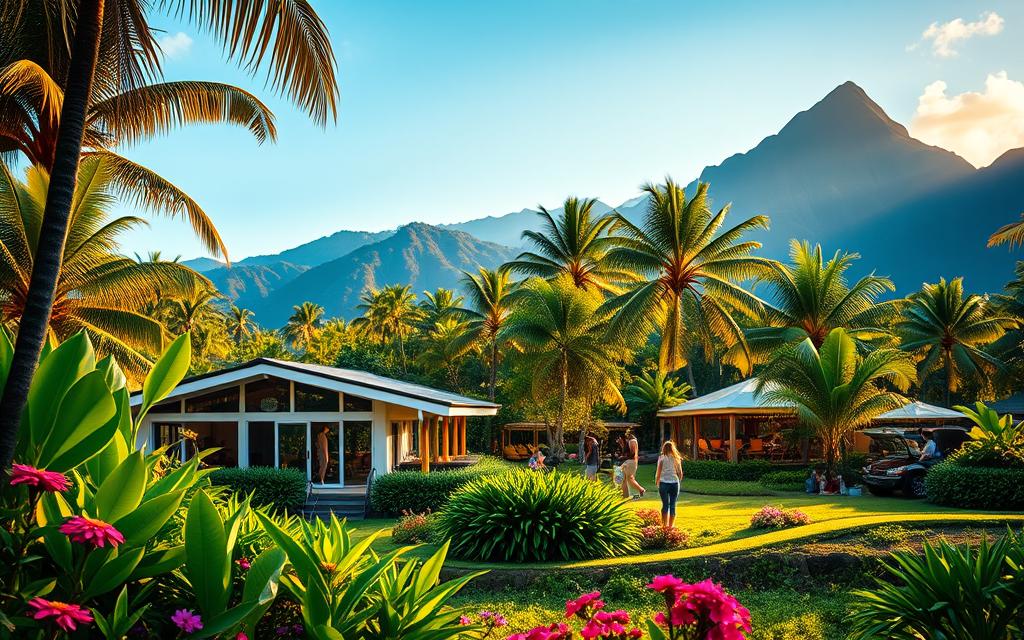
When considering a move to Costa Rica, one of the most critical decisions is whether to pursue residency. This choice can significantly impact your experience living in this vibrant country.
Key Benefits of Becoming a Legal Resident
Becoming a legal resident in Costa Rica offers numerous advantages. One of the most significant benefits is legal protection under local laws, simplifying processes such as opening a bank account or accessing healthcare. Residency also eliminates the need for frequent visa runs, allowing for uninterrupted living and the opportunity to fully integrate into Costa Rican society.
Potential Drawbacks to Consider
While the benefits of residency are clear, there are also challenges to consider. The immigration process can be complex, requiring various documents such as birth certificates and criminal records. Additionally, periodic renewals add to the bureaucratic workload, necessitating a significant time commitment.
To make an informed decision, it's essential to weigh these factors against the benefits of residency, considering your individual circumstances and goals.
Living in Costa Rica Without Residency

Living in Costa Rica doesn't necessarily mean you need to become a resident; there are alternatives. Many individuals visit Costa Rica on a tourist visa, which is automatically granted upon arrival for many nationalities.
The Perpetual Tourist Approach
The perpetual tourist approach allows individuals to stay in Costa Rica by leaving every 90 days and re-entering. This method, known as "border runs," resets the clock, enabling tourists to stay long-term. To Nicaragua or Panama, many travel to comply with visa regulations. While this approach is viable, it requires careful planning and can become costly over time.
Some individuals use these border runs as opportunities to explore Central America or return to their home countries. However, the perpetual tourist status comes with its challenges, including the logistics and costs associated with regular border crossings.
Limitations of Tourist Visa Status
Tourist visa status in Costa Rica comes with significant limitations. Opening a bank account can be challenging, and many day-to-day services are restricted. Moreover, tourists cannot utilize the public healthcare system, relying instead on private insurance. The lack of a DIMEX (resident ID card) affects daily life, from driving legally to accessing government services and establishing utilities.
Recent regulatory changes have made the perpetual tourist approach more challenging, pushing long-term visitors toward formal residency options. As a result, many are now considering the benefits of residency in Costa Rica.
Costa Rica Residency Options Explained
The country provides multiple pathways to residency, catering to a wide array of financial and personal situations. Costa Rica's residency program is designed to be inclusive, offering various categories that suit different needs and circumstances.
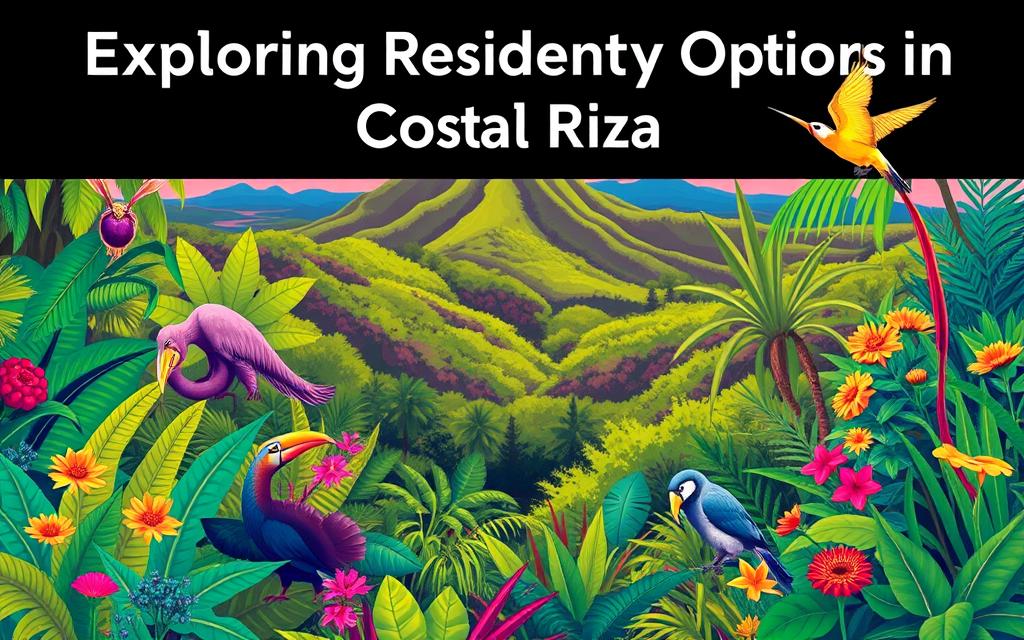
Pensionado Residency
The Pensionado visa is designed for retirees who receive a lifetime monthly pension of at least $1,000 from verifiable sources such as social security, retirement funds, or military pensions. There's no minimum age requirement for pensioners, making it accessible to those who qualify.
Rentista Residency
The Rentista visa is ideal for individuals with a stable income who are not necessarily retired. Applicants must demonstrate a monthly income of $2,500 for at least two years or have a $60,000 bank deposit in a Costa Rican financial institution. This option is suitable for those with a steady stream of income from various sources.
Inversionista Residency
For those looking to invest in Costa Rica, the Inversionista visa requires a minimum investment of $150,000 in real estate, businesses, or government-approved projects. This pathway is designed for individuals who wish to contribute to the country's development through their investments.
Digital Nomad Visa
Costa Rica's Digital Nomad visa is a newer option designed for remote workers with foreign income sources. The program allows for a stay of up to one year, with a simplified application process and tax benefits. It's an attractive option for those looking to experience Costa Rica while continuing their work abroad.
Each residency category has its advantages and limitations. By understanding the specific requirements and benefits of Pensionado, Rentista, Inversionista, and Digital Nomad visas, individuals can choose the option that best aligns with their financial situation and lifestyle goals. For more information on transitioning from temporary to permanent residency, visit this resource.
Dependent family members, including spouses and children under 25 years of age, can be included in the primary applicant's residency application, making it easier for families to relocate together.
The Path to Permanent Residency

Costa Rica offers a pathway to permanent residency for those who have been temporary residents for a certain period or have specific family ties. This status is particularly beneficial for individuals who wish to establish a long-term connection with the country.
Requirements and Timeframes
To qualify for permanent residency, one must have lived in Costa Rica on a temporary resident visa for at least three years or have a Costa Rican family member related by blood. The renewal process for permanent residents is simplified, requiring renewal every five years without needing to prove ongoing income or investment.
Benefits of Permanent Status
Permanent residency offers expanded rights, including the ability to work without additional permits. After seven years of legal residency, foreigners may apply for citizenship by naturalization, gaining the right to a Costa Rican passport and enjoying visa-free travel to many countries, along with full political rights.
Financial Considerations of Costa Rican Residency
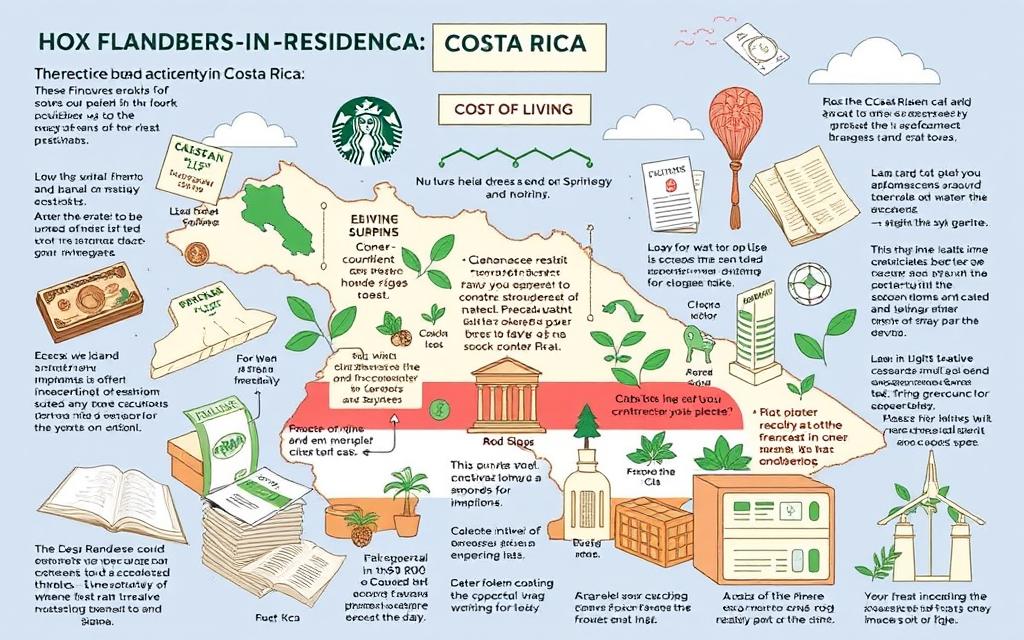
Understanding the financial requirements for Costa Rica residency is essential. The process involves various costs and financial considerations that applicants must be aware of.
Application Costs and Fees
The cost of applying for Costa Rica residency includes several components. These are government filing fees, document authentication expenses, attorney fees, and DIMEX card issuance costs. For instance, the Investor Visa requires a minimum investment of $150,000. We will provide a detailed breakdown of these costs to help you prepare.
Tax Implications for Residents
Costa Rica operates under a territorial tax system, meaning only income earned within the country is taxed. Foreign income is exempt, making it an attractive option for retirees and remote workers. This tax system is a significant advantage for those considering residency.
The financial requirements for each residency category vary. For example, Pensionados need to prove a $1,000 monthly pension, while Inversionistas must invest at least $150,000. Understanding these requirements is crucial for a successful application.
Healthcare Benefits for Costa Rica Residents

One of the most significant advantages of obtaining residency in Costa Rica is gaining access to its renowned healthcare system. As a resident, you'll be automatically enrolled in the Caja Costarricense de Seguro Social (CCSS), also known as "La Caja."
Access to the CAJA Healthcare System
The CAJA healthcare system provides comprehensive coverage, including primary care at local clinics (EBAIS), specialist consultations, hospital services, emergency care, prescription medications, laboratory tests, surgical procedures, and maternity care. One of the standout features of La Caja is its coverage of pre-existing conditions without exclusions, making it particularly valuable for retirees and those with chronic health issues.
Monthly contributions to La Caja range from 7% to 11% of your reported income, covering both the resident and their dependents. This contribution structure ensures that you and your family have access to quality healthcare services.
Private Healthcare Options
In addition to the public healthcare system, Costa Rica offers private healthcare options that many residents use to complement their CAJA coverage. Private insurance plans are available, with costs starting at around $60 per month. Facilities like CIMA, Clínica Bíblica, and Hospital La Católica offer high-quality care, often with shorter wait times compared to the public system.
Using private healthcare services in Costa Rica can result in significant savings compared to healthcare costs in North America or Europe. The quality of healthcare in Costa Rica is consistently ranked among the best in Latin America and is comparable to many developed nations.
Legal Rights and Restrictions
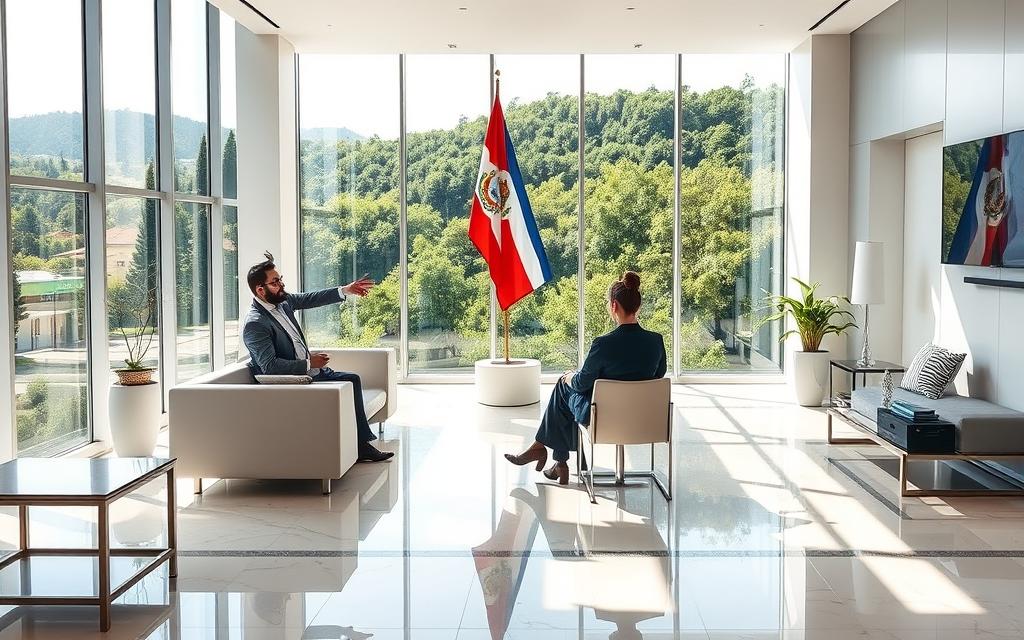
Navigating the legal landscape of Costa Rica residency involves understanding both the privileges and the restrictions it entails. As a resident, you'll have access to various benefits, but you'll also need to comply with specific regulations.
Banking and Financial Services Access
With Costa Rica residency, you gain full access to the country's banking system, including the SINPE (Sistema Nacional de Pagos Electrónicos) network. This is a significant advantage, as Costa Rican banks have become increasingly restrictive for non-residents due to international banking regulations and anti-money laundering policies. For instance, opening and maintaining a bank account becomes much easier, allowing for smoother financial transactions. You can learn more about the specifics of residency and its implications on your stay in Costa Rica by visiting this resource.
Property Ownership Rights
Both residents and non-residents can own property in Costa Rica, but residents enjoy simplified processes and potentially better financing options. This makes it easier for residents to invest in real estate, whether for personal use or as part of a business venture.
Employment Restrictions
Temporary residents face certain employment restrictions. While they can own a business and receive income from it, they generally cannot work as employees for Costa Rican companies without additional work permits. Permanent residents, however, have more flexibility and can work as employees without needing extra permits.
The Residency Application Process

To successfully obtain Costa Rica residency, it's crucial to comprehend the application process and its requirements. The journey involves several steps, from gathering necessary documents to submitting your application.
Required Documentation
The residency application process requires specific documents, including authenticated birth certificates, police clearances, and passport photos. Fingerprint registration and payment of fees are also mandatory. Ensuring that all documents are properly authenticated is crucial for a smooth application process.
Timeline Expectations
The processing time for Costa Rica residency applications typically ranges from 8 to 12 months. However, this timeframe can vary based on the volume of applications and the complexity of individual cases. Planning ahead and understanding these timelines can help manage expectations.
Working with Immigration Attorneys
Engaging an experienced immigration attorney can significantly streamline the residency application process. These professionals can navigate bureaucratic complexities, avoid common pitfalls, and ensure that applications are complete and accurate, thereby reducing the risk of delays.
By understanding the requirements and timelines of the Costa Rica residency application process, applicants can better prepare themselves for the journey ahead. Whether applying for temporary or permanent residency, careful planning and professional guidance can make a significant difference.
Conclusion: Making Your Decision
For those drawn to Costa Rica's pura vida lifestyle, residency can be a significant step towards making this paradise a permanent home. Costa Rica offers a variety of residency options to suit different needs and circumstances, including rentista residency for those with stable income, investment residency for entrepreneurs, and permanent residency for those wishing to live indefinitely in the country.
When deciding if Costa Rica residency is worth it, consider your lifestyle goals, financial circumstances, and long-term plans. The benefits of residency, such as access to affordable healthcare, freedom from border runs, banking privileges, and legal protections, often outweigh the investment of time and resources required.
Residency is not a one-size-fits-all decision; different pathways like Pensionado, Rentista, Inversionista, and Digital Nomad visas accommodate various life circumstances. We encourage you to consider both the practical and emotional benefits of residency, from convenience to a sense of belonging. For those interested in pursuing residency, consulting with immigration attorneys and gathering necessary documents is the next step.


